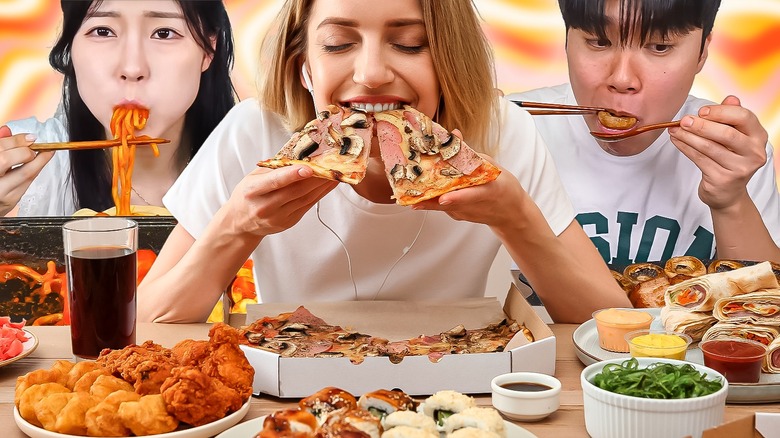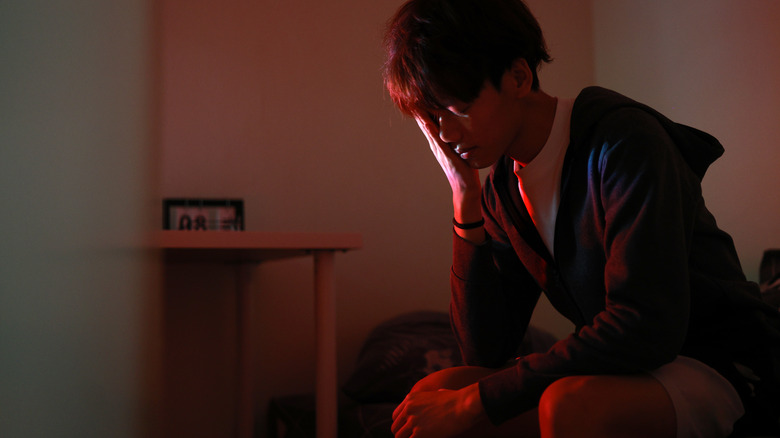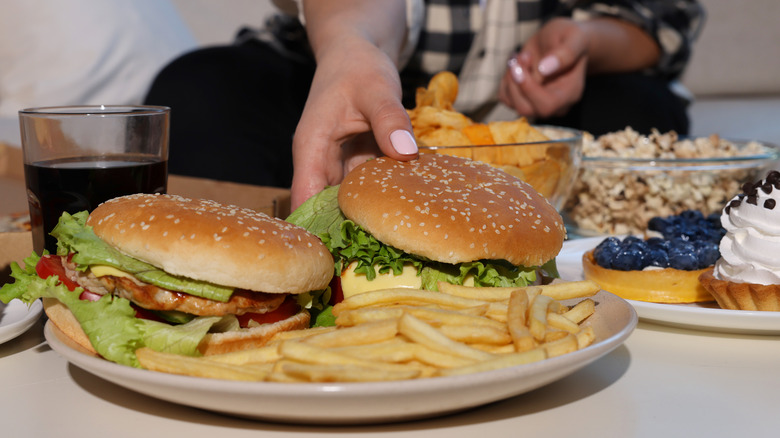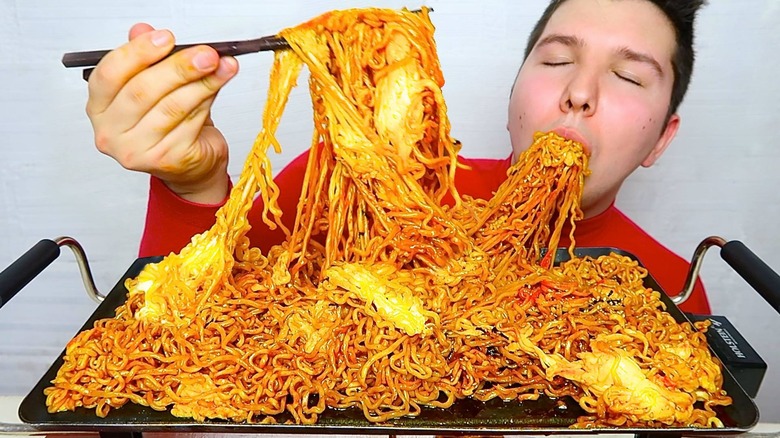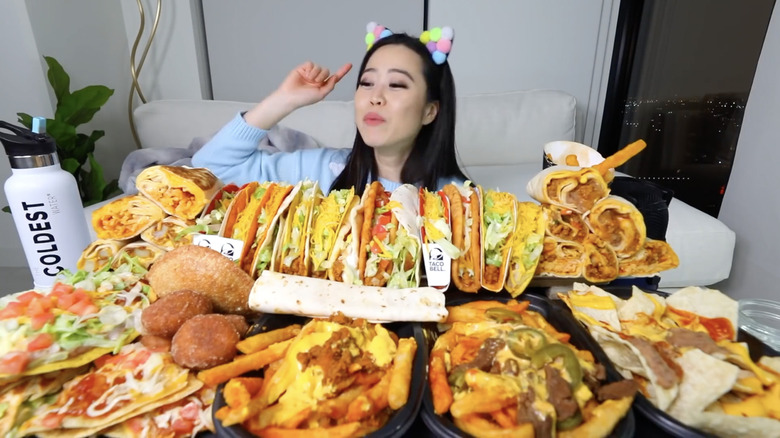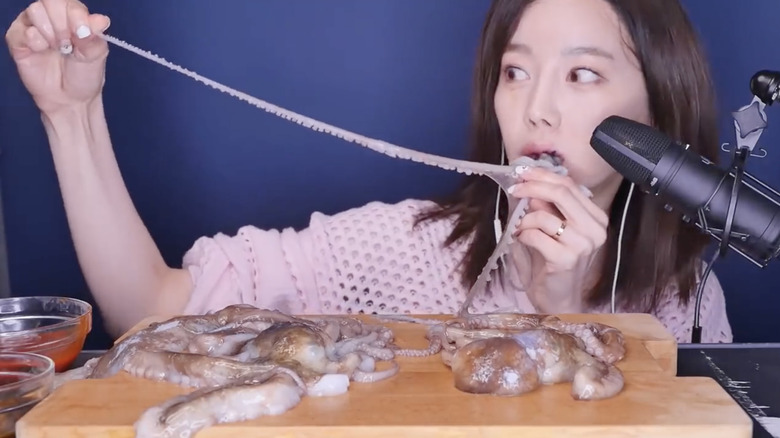Here's Why Mukbang Videos Attract So Much Controversy
Would you film yourself eating, knowing that thousands — potentially millions — were watching? Welcome to the life of a "mukbanger," creators who've made broadcasting their dinnertimes into a full-fledged career, often raking in thousands of dollars monthly. Although the concept may sound strange to the uninitiated, mukbang content has a dedicated global audience. The question is: Is it merely a form of escapist entertainment, or is the Korean sensation something more?
To answer this question, we've enlisted the expertise of two professionals in different fields. Dr. David Tizzard, a leading authority on Korean culture, will shed light on the cultural and historical importance of mukbang, in addition to societal attitudes towards body image — a progressively pertinent talking point. Meanwhile, Dr. Andrew Harris, a respected psychology lecturer, will help us simplify the discussion regarding potential mukbang addiction and the glamorization of overconsumption. The goal? Discerning which concerns hold serious weight and which are exaggerated conjectures.
There are many layers to unpeel (excuse our food puns), so settle down with your favorite dish (we have a topical selection of Korean dishes everyone needs to try!). We'll be delving into the psychological impact on both creators and viewers, grappling with ethical debates surrounding the consumption of live animals, and addressing backlash against audience exploitation, so a content warning is necessary. This article discusses sensitive topics, including eating disorders, self-harm, and animal abuse.
What is mukbang?
While people in the "foodie-sphere" may have stumbled across — or even be avid consumers of — mukbang videos, if the word conjures a big question mark in your mind, you're not alone. What exactly is a mukbang? Let's explain. Characterized by a host eating food in front of a camera (typically live-streamed, although occasionally pre-recorded), the word is Korean, a portmanteau of meokda (meaning "eat") and bang song ("broadcast"). There are a few classifications of mukbang, including ASMR (autonomous sensory meridian response), whereby the host amplifies eating noises sans talking; storytime mukbang, involving an engaging narrative; collaborative mukbang with other creators; or casual chatty mukbang.
As per Dr. David Tizzard, who hosts a podcast called Korea Deconstructed, mukbang videos exploded in popularity between the late 2000s and early 2010s. "While, to some extent, the culture had been there for a while, it was now a visible trend that was being talked about in media and capitalized on by various industries," he says, and points to Korea's rapid technological advances in addition to social and cultural changes as reasons for the seemingly sudden boom of mukbang related media.
Despite its Korean conception, mukbang content has grown increasingly prevalent in other countries, including India and the U.S., evolving from the Korean streaming platform Afreeca TV to YouTube and TikTok. Creators with over five million subscribers, such as Trisha Paytas, profited from the trend, while large conglomerates like Vogue jumped on the bandwagon, only increasing the craze's upward trajectory.
The importance of communal dining in Korean culture
To understand the culture around mukbang, we need to understand the environment of its birthplace: South Korea. We turned to Dr. Tizzard, who currently teaches Korean Studies in Seoul, to educate us on the importance of mukbang within Korean life. He starts by explaining that historically, communal eating stood as an inseparable component of Korean cultural food practices; the cuisine's traditional propensity towards large sharing bowls, the imperative of not serving yourself alcohol, and the etiquette of allowing the eldest at the table to all eat first are all examples of how the building blocks of Korean fare lends itself to shared feasting. Furthermore, Dr. Tizzard highlights the entrenchment of the mindset during mandatory military service — which mandates waking, showering, exercising, and sleeping simultaneously.
However, this is rapidly changing. Dr. Tizzard attributes the shift to neoliberalism, pointing to the increase of women in the workplace and children taking part-time jobs to the demise of ubiquitous multi-generational family dining. Was this the end of Korean family-style dining? Not exactly.
As Dr. Tizzard articulates, mukbang — broadcasting yourself eating to an audience — filled the void created by altering political and cultural movements. Indeed, mukbang appears to be one of the most notable instances of utilizing technology to form a sense of "found family" in a fast-paced world.
Watching mukbang videos can lead to addiction
For almost as long as the Internet has existed, there has been debate over its propensity to cause addiction, and these worries have only increased after the advent of social media. Perhaps unsurprisingly, then, some research suggests that mukbang videos can be similarly addictive, even causing similarly harmful side effects as more severe addictions. Although we often joke about being addicted to social media or our phones (guilty as charged), for some, this is a painful reality.
To understand more about the subject, we spoke to Dr. Andrew Harris of NTU psychology at Nottingham Trent University. Discussing the content of mukbang videos, he suggests the sensory stimuli of ASMR-focused mukbang videos and the narrative engagement of storytime mukbang has the ability to enhance the addictive nature. But what makes the format so compelling? It's multifaceted, with Dr. Harris emphasizing the context in which people watch the videos — often live — can "create a social hub," meaning people return both for content and social connections. "One aspect is the sensory experience they provide," explains Dr Harris. "Including visual and auditory stimulation of food consumption, which can trigger pleasure responses similar to those associated with food addiction."
While the fact that watching mukbang videos can lead to addiction is enough reason for controversy, it's unlikely you'll hear mainstream dialogue about the subject. It's still a niche activity, and affected people may hide the habit from loved ones due to denial, shame, or guilt.
Loneliness and isolation are side effects of mukbang dependency
Designed to combat loneliness and fill the void of social connection, it seems ironic that mukbang could have the opposite effect. However, in a recent paper on the addictive symptoms of mukbang watching, that's precisely what Dr. Harris and his research team of Dr. Kagan Kircaburun, Dr. Filipa Calado, and Professor Mark Griffiths propose. "While some studies suggest that watching mukbang videos can alleviate feelings of loneliness by providing a sense of social connection or companionship," said Dr. Harris. "Others indicate that excessive consumption of these videos may exacerbate loneliness by substituting deeper real-life social interactions with more superficial virtual ones."
So, what's the difference between watching mukbang videos and engaging in any other hobby? Dr. Harris describes it as the "presence of harm," warning that addiction to mukbang watching can contribute to everything from social isolation to improper dietary habits. Perhaps most worryingly, the linked paper — led by Dr. Kircaburun — outlines several symptoms common to behavioral addictions, including "preoccupation, withdrawal [...], loss of interest in other activities, continuing to watch despite problems it's causing, deceiving family/friends about mukbang engagement, [...] and risking relationships" are present mukbang dependency. However, Dr. Harris acknowledges that research on the matter is mixed — with some researchers still suggesting that mukbang fulfills the initial intent of alleviating loneliness.
Viewers can develop body image issues after watching mukbang
Among the top Google searches sits the question, "How do mukbangers stay skinny?" The phenomenon of content creators consuming abnormal quantities of food on camera without gaining weight has sparked potentially problematic discourse, including demands that influencers publicly share their weight. It's feasible these discussions — or simply viewing the videos — may lead some viewers who struggle with positive self-image to feel inadequate as they eat similar or less food yet see weight gain.
In enlightening statistics from a recent Harvard-published paper, an estimated 9% of the U.S. population will suffer from an eating disorder in their lifetime. In other countries without body-positive movements seeking to disassociate weight from health — such as Korea — beauty standards impact daily life even more so. Illustrating this point, Dr. David Tizzard explains that Korean culture subconsciously associate morality with external beauty, suggesting extreme pressure to conform to societal norms.
When asked about the topic, Dr. Andrew Harris referenced a research paper on the subject, quoting, "Participants with greater body dissatisfaction watched mukbang more frequently and were more likely to eat while watching mukbang." Although he shared that research on the subject is scarce and the scientific community's understanding is currently mostly correlational.
Mukbang content can promote overeating
Beyond controversy, some people claim mukbang is a potentially dangerous trend as it may inadvertently enable eating disorders. According to Dr. Harris, people can be swayed by what they see in the media — hence the term influencer. He sheds light on the matter, elaborating that, "This could include overeating or adopting similar eating habits, especially if viewers perceive the behaviour as desirable or normalized within the context of the videos." Over time, frequent exposure to mukbang-related content could distort viewers' understandings of a normal or healthy amount of food, leading to over-eating or binging.
These troubles extend to the mukbang creators, too. Korean cultural expert Dr. David Tizzard says an "attention economy" prompts people to extreme measures in "search of money and fame." Could this be why we see so many controversial behaviors from creators, including a spiraling effect where we see competitive internet personalities "one-upping" each other on everything from calorie challenges to the frequency of upload dates?
It's suspected some creators binge-eat as self-harm in mukbang videos
As we touched on, the mukbang trend can also hurt creators. One U.S.-based YouTuber has a reputation in the community, making global headlines: Nikocado Avocado. The internet celebrity, whose real name is Nicholas Perry, was one of the first American mukbang creators, garnering over 5 million subscribers across his six channels since he started exploring the format in 2016. Notably, he's also one of the only male mukbangers with a substantial following.
Famous for his on-camera dramatics and fluctuating weight, Nikocado Avocado has hundreds of videos indulging in pizza, fast food, and instant noodles, such as "Eating My Weight In Taco Bell." Fans have repeatedly expressed concern for the creator, who often cries about his weight gain on camera, and describes his mental health decline. While some interview quotes may indicate his theatrics are premeditated, it's vital to consider we never know what's going on behind the camera. Tragically, the pressure to perform for an audience may push mukbangers to eat progressively more food or create more personal "drama."
Undeniably, Nikocado Avocado's physical and mental health has significantly deteriorated throughout his time on YouTube, leading many to suggest he uses videos such as the "10,000 calorie challenge" to binge or compulsively eat — both dangerous eating disorders — as an unhealthy coping mechanism for mental health issues. Further supporting this, research from the University of Chester denotes the connection between eating disorders and self-harm.
Others use mukbang as a way to vicariously gain satisfaction without eating food
On the opposite side of the spectrum, some people watch mukbang videos not for entertainment or social connections but to fuel restrictive eating. Dr. David Tizzard, one of our expert commentators, says this is common in Korea and known as "daeri manjok (vicarious satisfaction)." Dr. Tizzard explains, "People can get the (vicarious) pleasure from various activities but suffer none of the consequences."
Vicarious eating isn't an occurrence specific to Korea. An American woman declared she watches three mukbang videos daily as motivation to lose weight, turning to the content each time she craves sweets or "bad foods" (per the Tampa Bay Times). Similarly, Dr. Tizzard speculates that as advertising for calorific takeout foods intensifies, instead of succumbing to the urge for dishes like crispy Korean fried chicken, people watch others eat. Disordered eating — such as restricting the amount you eat or skipping meals — is one of the most common risk factors for developing an eating disorder, which can be potentially life-threatening.
Food waste is a growing concern globally
Amidst rising unease about food scarcity and inequality worldwide, wastage plays a substantial role. According to the WFP (World Food Programme), statistics reveal a shocking one-third of all food produced globally goes to waste. Now picture this: Entire fast food menus spread out on a table, sometimes approaching (or superseding) over 20 items. Considering many mukbangers stream content daily — or at least weekly — we should ask ourselves whether this is sustainable. The U.S. says no; lawmakers have proposed legislation to slash food waste.
Likewise, in an aggressive move, the Chinese government recently "shadow-banned" mukbang content, going so far as to blur video content to discourage people from watching. Getting to that stage might be hard enough, as Chinese citizens report searching for terms like "eating show" results in popup messages discouraging food waste and promoting healthy eating. Has China gone too far with censorship? Food for thought.
The influx of influencers wasting food made it onto our staff picks for the worst 2023 trends, and it doesn't appear to be slowing. Moreover, recent research exploring the correlation between food waste and mukbang viewing suggests the vilification of mukbang creators isn't entirely unjustified.
Activists say some mukbang content is unnecessarily cruel
While some mukbang creators indulge in plates like budae jjigae (Korean army base soup) or jajangmyeon (Korean black bean noodles) — certain internet personalities have faced criticism due to their unusual choice of meals. At the forefront is Ssoyoung, a Korean YouTuber with almost 11 million subscribers. Her videos have attracted attention for all the wrong reasons, with multiple channels, including h3h3Productions (Ethan Klein), calling the content "brutal" and others appealing to YouTube for her to be de-platformed.
The videos in question include her eating live octopus and squid. Moreover, an unsettling video depicts the creator slowly killing mudfish by smothering them in salt. As the fish writhe in suffering, she appears to act frightened, possibly for comedic effect, before cooking them. Another video shows her attempting to pull out a turtle's head before boiling it alive, calling users on Reddit to brand her behavior "literally torture."
Ssoyoung's representatives addressed the concerns by explaining that her primary goal is to introduce the audience to new food by focusing on Korean food culture. YouTube has also weighed in, stating the videos don't break its terms of service, which includes a ban on animal cruelty. While it's true that eating live seafood is a common cultural practice in Korea, some viewers don't agree it's enough reason to continue. Regardless of Ssoyoung seemingly pausing these videos, other creators continue — and many still associate the action with mukbang.
Mukbang creators have been called out for insensitive coverage of true crime stories
Mukbang isn't the only trend taking over the internet. True crime is a genre in which people discuss real-life criminal cases — often involving serial killers or other dark material — and it's hit big on platforms like YouTube and TikTok, where creators have wracked up millions of subscribers by discussing the topic while doing everyday tasks like makeup, or, in the case of people like Stephanie Soo, Foodie Beauty, and many more, mukbang.
Thumbnails often involve the typical mukbang setup — piles of food — overlaid with graphic images of murder victims and serial killer mugshots. Arguments against the content theorize that eating while discussing upsetting crimes is disrespectful to victims, and regularly watching the videos could cause viewers to become desensitized to violence.
"Exposure to graphic or disturbing content," explains Dr. Harris. "Especially when paired with pleasurable stimuli like food consumption, may dull emotional responses over time." He calls the field of media effects highly controversial, clarifying that the news is just as likely to incur the same consequences.
Some influencers haven't disclosed partnerships or ads with viewers
Albeit far less erroneous than former controversies associated with the mukbang trend, creators have come under fire lately for failing to declare paid sponsorships or advertisements. It's not unusual for influencers to partner with brands for a fee — with reports speculating that some are paid upwards of $10,000, depending on their reach — and mukbang creators are no different, often collaborating with brands to sell products to their audience.
Picture this: If a beloved internet personality raves about a brand, you might purchase the product they endorsed. In the worst scenario, you could end up with a misrepresented item — as the creator had a vested interest in financial gain. In such cases, influencers leave fans feeling used, with one writing: "I feel deceived that you have been lying to your fans. I will never watch your videos again" under a mukbang video (via The Korea Times). Public unrest and scrutiny over what many considered misleading material recently led to the U.S.-based FTC (Federal Trade Commission) stepping in to revise its endorsement guidelines, clarifying all advertisements must be "clear and conspicuous." Similar legally binding advertisement guidelines appear globally.
Perhaps unsurprisingly, countless Korean mukbang YouTubers have faced similar vitriol from indignant viewers. Further examples include Eat with Boki, an uber-popular YouTuber with over 9 million subscribers, who later apologized, while another internet sensation with almost 10 million subscribers, tzuyang, announced she planned to quit after the fiasco (although she later rescinded the statement and still makes videos).
Static Media owns and operates The Daily Meal and Tasting Table.
